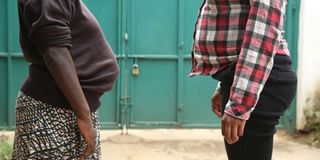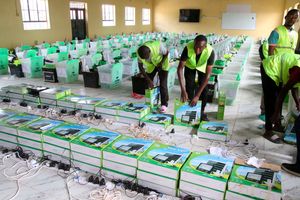Teen pregnancies in Narok, Kiambu alarming

Narok and Kiambu counties are among those struggling to tame the rising cases of teen pregnancy. Most visits to antenatal clinics are of girls aged below 19.
Majority of females attending pre-natal clinics in Narok County are girls below 19 years, a new report by the Anti-FGM Board has revealed.
The report collected in sampled clinics and health centres across six sub-counties between March and August this year revealed that 45 per cent of those visiting clinics were teenagers.
And as schools remain closed in the wake of the Covid-19 pandemic, the future of girls in pastoral parts of Narok County faces a bleak future as more than 5,000 schoolgirls fall pregnant as others are forced into early marriage and Female Genital Mutilation (FGM).
Of this cases 1,159 girls are currently attending clinics at the Narok Referral Hospital, 500 in Nairagie Enkare in Narok East and 47 at Ololulunga Level 4 Hospital in Narok South.
The alarming number of teenage pregnancies has irked local leaders and the clergy who have now called for the girls to be given a second chance to go back to school after giving birth.
Future of girls
The Anti-FGM Board chairperson Ms Agnes Pareiyo, said Narok currently has 5,538 cases of reported teenage pregnancies, which poses a threat to the future of the girls.
“For the last five months, we have had more than 5,000 cases. What will happen before January? By then, I fear no girl will be able to report back to school,” said Ms Pareiyo.
Speaking during Narok County interfaith day two of the Covid-19 prayers at Suswa trading centre, Ms Pareiyo also regretted that FGM was being done secretly.
She said circumcision of boys was currently being used to cut girls in the guise that it was an extension of the boys’ initiation ceremonies.
“We have discovered that the boys’ and girls’ circumcision were now being done at the same time to cover up the illegal act. We have informed the law enforcers and hope the law will take its course,” said Ms Pareiyo.
Sanitary pads
Mr Petero Nkamasiai, the chairman at Kikuyan Community Based Organisation said 1,000 girls, in Narok East, have been affected adding that the issue of sanitary pads still needs to be addressed.
Mr Nkamasiai said parents should ensure their daughters get sanitary pads just like they did when they were in school.
He noted that most men, especially boda operators, are taking advantage of the young girls' predicament to lure them into sexual activities in exchange of sex for as low as Sh50.
County Governor Samuel Tunai who spoke during the prayer meeting promised to convene an urgent meeting with relevant stakeholders to discuss the way forward on combating teenage pregnancies, early marriages and FGM.
Anglican Church
“It is regrettable that teenage pregnancy cases are still soaring in Narok. This is highly unacceptable and the police and chiefs should work round the clock to ensure the impregnators are brought to book,” said Mr Tunai.
Anglican Church of Kenya Archbishop Jackson ole Sapit also condemned rampant teenage pregnancies and asked parents not to forcefully marry off their pregnant daughters but instead take them back to school after giving birth.
“Parents should take care of their daughters’ babies and give them a chance to go back to school because they have a future. Should we allow them to be married off, we will have destroyed their lives,” warned Ole Sapit.
Teenage pregnancies in the county have been linked to FGM, poverty which forces many girls to look for boyfriends to buy them basic needs.
Latest statistics
In the populous Kiambu County, latest statistics from Kenya Health Information System by the Ministry of Health released recently also indicate thousands of underage girls have fallen pregnant in the last one and a half years.
The glaring statistics, which were released during the launch of the count Resilience and Recovery Program in Ruiru, indicates that 378 girls aged 10-14 years visited various health facilities to seek antenatal care.
From January to June this year, 100 girls in the same age bracket have also sought antenatal care from various health facilities.
Among girls aged 15-19 years, 13,148 visited hospitals in the county for antenatal clinics. From January to June this year, a total of 5,548 had sought antenatal care in health facilities.
Kiambu Woman Representative Gathoni Wamuchomba through the County Government has launched a campaign dubbed Stop Teenage Pregnancy: Adopt a Teenage Mum.
Back to school
Wamuchomba said apart from adopting the teenage pregnant girls and mothers, the campaign will work to ensure the girls go back to school once schools resume next year.
“The campaign will also help in providing caregivers for the girls in most need to enable them to go back to school and offer free legal support to help pursue the perpetrators of sexual violation meted upon the girls,” said Wamuchomba.
The campaign will among other things involve elected leaders, women leaders, religious leaders and parents in the county. Various government agencies will also be involved to sensitize locals on the dangers of teenage pregnancies and what the law says about the offence.
“Teenage pregnancy is not a Covid-19 problem. In fact, we are yet to see the worst of Covid pregnancies. Many of those we are dealing with now were conceived in December, January and February before the pandemic was confirmed in the country,” she said.
Sexual violence
May Kamau the Kiambu County Executive .member in-charge of gender said the county is committed to ensure cases of sexual violence and teenage pregnancies come down.
He said sexual and gender-based violence (SGBV) is bringing in huge loss to the country with the county losing Sh5 billion due to sexual violence.
The CEC challenged men leaders to join the campaign to condemn sexual violence against girls and women, and at the same time spearhead efforts to mentor the boy child to learn to respect girls and women.
“All the stakeholders including the administration, church, parents, county government and legal fraternity should come together to win the war against SGBV,” she said.
The county official added the devolved unit will allocate resources to fight sexual violence among women in the county including building safe shelters to house victims and survivors.
Gatundu North MP Wanjiku Kibe said perpetrators of SGBV must face the law.
Solid evidence
Ms Kibe, however, noted that to ensure justice for victims and survivors, solid evidence is key and should be collected and stored safely.
“Gender desks in police stations must also be made to work by training some police officers of how to handle SGBV cases,” she said.
Data from Kenya Data and Health Survey (2014) show that 1 in every 5 girls between 15-19 years is either pregnant or already a mother.
As of 2019 latest statistics from the Global Childhood Kenya has the third-highest teen pregnancy rates with 82 births per 1,000 births.
According to the United Nations Population Fund Report, Kenya has recorded 378, 397 adolescent and teenage pregnancies for girls aged 10-19 years between July 2016 and June 2017, specifically, 28, 932 girls aged 10-14 and 349,465 girls aged 15-19 became pregnant.
Over 13,000 teenage girls drop out of school annually because of pregnancy. (Kenya Data and Health Survey, 2014).
Recent media reports show that 449 girls are failing to sit for their final examinations while others write examinations in maternity wards.






